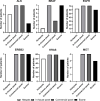Is There a Role for Large Exome Sequencing in the Management of Metastatic Non-Small Cell Lung Cancer: A Brief Report of Real Life
- PMID: 35330711
- PMCID: PMC8940536
- DOI: 10.3389/fonc.2022.863057
Is There a Role for Large Exome Sequencing in the Management of Metastatic Non-Small Cell Lung Cancer: A Brief Report of Real Life
Abstract
Introduction: Non-small-cell lung cancer (NSCLC) is one of the main causes of death by cancer worldwide. With the rise of targeted therapies, the search for molecular abnormalities is becoming a crucial step in the management of lung cancer. Whole exome sequencing (WES) is developing rapidly and is now accessible in routine care. However, its value, compared to smaller gene panels, remains unclear.
Methods: We conducted a retrospective analysis of all 281 patients with lung carcinoma referred to the Molecular Tumor Board of the Georges-François Leclerc Cancer Center (CGFL) between March 2015 and January 2018. We compared the results of standard molecular testing with the results of WES performed on every patient.
Results: WES highlighted many more mutations than smaller panels (mutations were found in 82 genes, while smaller panels found, at the most, mutations in 12 genes). Most of these mutations were class III or IV according to the ESCAT classification. The exome sensitivity also showed limitations, notably a slightly lower efficiency for common mutations, including classical EGFR mutations.
Conclusion: Small, targeted panels could be preferred over WES at the initial diagnosis of metastatic NSCLC. They are more sensitive for the identification of mutations on the most frequently mutated genes, such as ALK, BRAF, EGFR, ERBB2, KRAS or MET. Larger panels or WES could be useful at disease progression, to enlarge treatment possibilities by highlighting uncommon but potentially targetable mutations that are not covered by smaller, targeted panels.
Keywords: exome analysis; large NGS panel; lung adenocarcinoma; small NGS panel; utility.
Copyright © 2022 Dalens, Niogret, Kaderbhai and Boidot.
Conflict of interest statement
The authors declare that the research was conducted in the absence of any commercial or financial relationships that could be construed as a potential conflict of interest.
Figures



References
-
- Massard C, Michiels S, Ferté C, Le Deley M-C, Lacroix L, Hollebecque A, et al. . High-Throughput Genomics and Clinical Outcome in Hard-To-Treat Advanced Cancers: Results of the MOSCATO 01 Trial. Cancer Discovery (2017) 7(6):586−95. doi: 10.1158/2159-8290.CD-16-1396 - DOI - PubMed
-
- Mosele F, Remon J, Mateo J, Westphalen CB, Barlesi F, Lolkema MP, et al. . Recommendations for the Use of Next-Generation Sequencing (NGS) for Patients With Metastatic Cancers: A Report From the ESMO Precision Medicine Working Group. Ann Oncol (2020) 31(11):1491−505. doi: 10.1016/j.annonc.2020.07.014 - DOI - PubMed
-
- Yang JC-H, Sequist LV, Geater SL, Tsai C-M, Mok TSK, Schuler M, et al. . Clinical Activity of Afatinib in Patients With Advanced Non-Small-Cell Lung Cancer Harbouring Uncommon EGFR Mutations: A Combined Post-Hoc Analysis of LUX-Lung 2, LUX-Lung 3, and LUX-Lung 6. Lancet Oncol (2015) 16(7):830−8. doi: 10.1016/S1470-2045(15)00026-1 - DOI - PubMed
LinkOut - more resources
Full Text Sources
Research Materials
Miscellaneous

